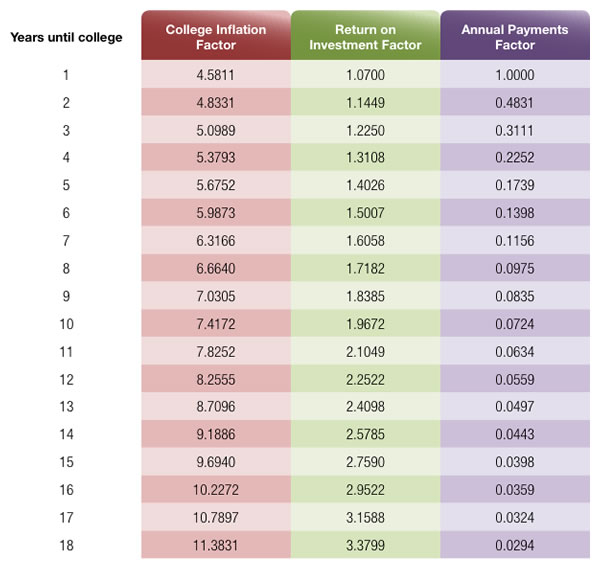Healthcare Provider Update: Provides medical, dental, vision, life, and disability insurance. Includes FSA, 401(k), paid time off, and family medical leave. ACA planning recommended for early retirees facing 2026 cost increases Click here to learn more
It doesn’t take a degree in finance to see the cost of college continues to rise.
In its 2017 report, the College Board showed that public four-year institutions raised prices an average of 3.2% annually between the 2007-08 and 2017-18 school years. Put another way, a $5,000 education in 2007-08 would cost $6,851 in 2017-18.
For a few families, the lion’s share of education costs falls on parents and, in some cases, on grandparents. For our Huntsman clients who are parents you may already know, generally, the majority of families rely on a combination of scholarships, grants, financial aid, part-time jobs, and parent support to help pay the cost.
For Huntsman employees who have children approaching college age, a good first step is estimating the potential costs. The accompanying worksheet can help you get a better idea about the cost of a four-year college.
For Huntsman employees who already put money away for college, the worksheet will take that amount into consideration. For Huntsman employees who haven’t, it’s never too late to start.
Resources
There are a number of resources that can help individuals prepare for college. The U.S. government distributes certain information on colleges and costs. Here are two sites for these Huntsman employees to consider reviewing:
www.studentaid.ed.gov
The government’s college and financial aid portal.
Featured Video
Articles you may find interesting:
- Corporate Employees: 8 Factors When Choosing a Mutual Fund
- Use of Escrow Accounts: Divorce
- Medicare Open Enrollment for Corporate Employees: Cost Changes in 2024!
- Stages of Retirement for Corporate Employees
- 7 Things to Consider Before Leaving Your Company
- How Are Workers Impacted by Inflation & Rising Interest Rates?
- Lump-Sum vs Annuity and Rising Interest Rates
- Internal Revenue Code Section 409A (Governing Nonqualified Deferred Compensation Plans)
- Corporate Employees: Do NOT Believe These 6 Retirement Myths!
- 401K, Social Security, Pension – How to Maximize Your Options
- Have You Looked at Your 401(k) Plan Recently?
- 11 Questions You Should Ask Yourself When Planning for Retirement
- Worst Month of Layoffs In Over a Year!
- Corporate Employees: 8 Factors When Choosing a Mutual Fund
- Use of Escrow Accounts: Divorce
- Medicare Open Enrollment for Corporate Employees: Cost Changes in 2024!
- Stages of Retirement for Corporate Employees
- 7 Things to Consider Before Leaving Your Company
- How Are Workers Impacted by Inflation & Rising Interest Rates?
- Lump-Sum vs Annuity and Rising Interest Rates
- Internal Revenue Code Section 409A (Governing Nonqualified Deferred Compensation Plans)
- Corporate Employees: Do NOT Believe These 6 Retirement Myths!
- 401K, Social Security, Pension – How to Maximize Your Options
- Have You Looked at Your 401(k) Plan Recently?
- 11 Questions You Should Ask Yourself When Planning for Retirement
- Worst Month of Layoffs In Over a Year!
www.collegeboard.org
The group that administers the SAT test.
Estimating the Cost of College


What is the Huntsman 401(k) Savings Plan?
The Huntsman 401(k) Savings Plan is a retirement savings plan that allows employees of Huntsman to save a portion of their paycheck before taxes are taken out.
How can I enroll in the Huntsman 401(k) Savings Plan?
Employees can enroll in the Huntsman 401(k) Savings Plan by visiting the company's benefits portal and completing the enrollment process online.
What is the employer match for the Huntsman 401(k) Savings Plan?
Huntsman offers a competitive employer match for contributions made to the 401(k) Savings Plan, which helps employees maximize their retirement savings.
At what age can I start contributing to the Huntsman 401(k) Savings Plan?
Employees can start contributing to the Huntsman 401(k) Savings Plan as soon as they are eligible, typically upon their date of hire.
What types of contributions can I make to the Huntsman 401(k) Savings Plan?
Huntsman allows employees to make pre-tax contributions, Roth (after-tax) contributions, and catch-up contributions if they are age 50 or older.
How often can I change my contribution percentage for the Huntsman 401(k) Savings Plan?
Employees can change their contribution percentage for the Huntsman 401(k) Savings Plan at any time, typically through the benefits portal.
Does Huntsman offer investment options within the 401(k) Savings Plan?
Yes, the Huntsman 401(k) Savings Plan offers a variety of investment options, including mutual funds, stocks, and bonds, to help employees grow their savings.
What happens to my Huntsman 401(k) Savings Plan if I leave the company?
If you leave Huntsman, you have several options for your 401(k) Savings Plan, including rolling it over to an IRA or a new employer's plan, or cashing it out.
Can I take a loan against my Huntsman 401(k) Savings Plan?
Yes, Huntsman allows employees to take loans against their 401(k) Savings Plan, subject to certain terms and conditions.
Are there penalties for early withdrawal from the Huntsman 401(k) Savings Plan?
Yes, early withdrawals from the Huntsman 401(k) Savings Plan may incur penalties and taxes unless specific conditions are met.
/General/General%205.png?width=1280&height=853&name=General%205.png)



-2.png?width=300&height=200&name=office-builing-main-lobby%20(52)-2.png)









.webp?width=300&height=200&name=office-builing-main-lobby%20(27).webp)


-2.png)









.webp)